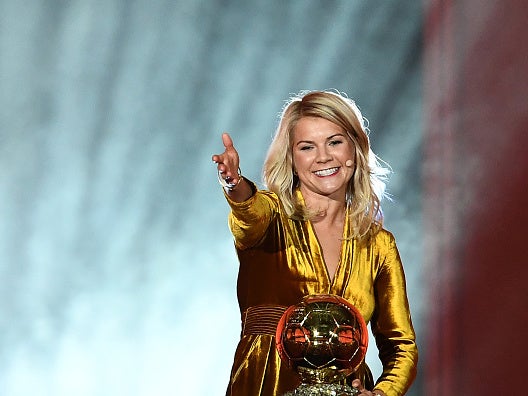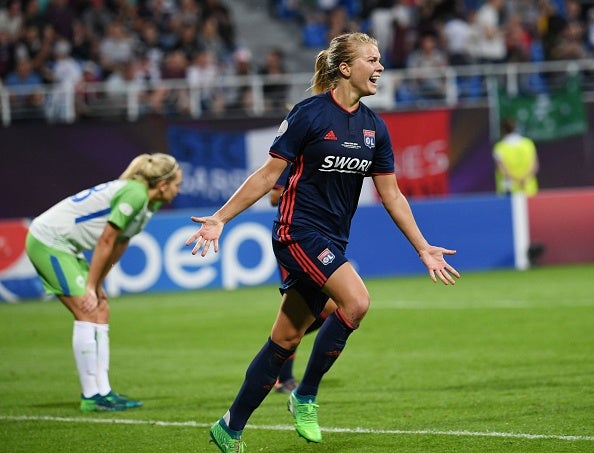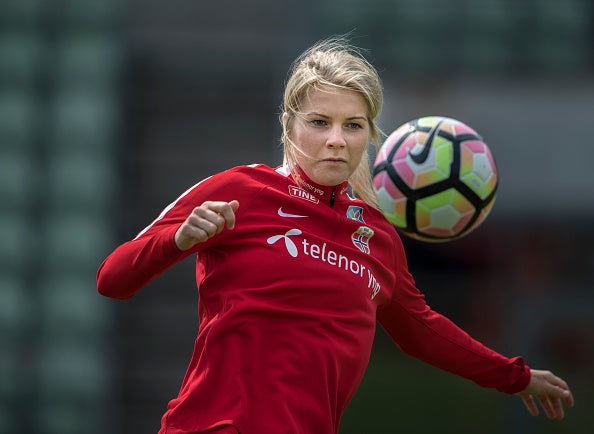Ada Hegerberg: Unflinching, uncompromising, the making of the world’s greatest female footballer
Exclusive interview: The 23-year-old Ballon d'Or winner, set to surpass 300 career goals this year, is an endearing enigma

Your support helps us to tell the story
From reproductive rights to climate change to Big Tech, The Independent is on the ground when the story is developing. Whether it's investigating the financials of Elon Musk's pro-Trump PAC or producing our latest documentary, 'The A Word', which shines a light on the American women fighting for reproductive rights, we know how important it is to parse out the facts from the messaging.
At such a critical moment in US history, we need reporters on the ground. Your donation allows us to keep sending journalists to speak to both sides of the story.
The Independent is trusted by Americans across the entire political spectrum. And unlike many other quality news outlets, we choose not to lock Americans out of our reporting and analysis with paywalls. We believe quality journalism should be available to everyone, paid for by those who can afford it.
Your support makes all the difference.Ada Hegerberg, the greatest female footballer alive, is smiling, giggling even. For two weeks, the Ballon d’Or winner has been basking in anonymity in Sunndal, a sleepy mountain village in western Norway. The winter break, the Lyon striker says with relief, came at the perfect time after the “surreal but very intense” ‘twerk’ fallout.
Hegerberg is just 23 years old, a three-time Champions League winner, and set to surpass 300 career goals this year, scoring at a rate beyond even Lionel Messi and Cristiano Ronaldo. Her stoppage-time winner in the 2015 Champions League final – arising from a two-footed tackle, shimmying around Atletico Madrid’s oncoming goalkeeper, before curling a shot over the heads of two defenders and into the top corner – is already counted as one of the best in history.
But on her annual homecoming reprieve, the routine remains fastidiously unchanged. Reunited with sister Andrine – two years her senior and playing for rivals PSG – the Hegerberg’s are training in the snow and under the instruction of their father ahead of the second half of the season. This, Ada insists, is relaxation.
In Norway, there is a group who see Hegerberg as unbecomingly boisterous. She has been labelled as argumentative, selfish, a prima donna even. The country’s best player hasn’t featured for the national team since the European Championships in 2017 when she stormed down the tunnel without her teammates. She’s ruled herself out of playing at the World Cup this summer, a decision – or an unburdening – she believes she could have never won the Ballon d’Or without.
But as the affable extrovert tells of her love of reading, a longing to ski, teases about hapless Google translations and admits she’s too scared to take her shiny new bauble home, there is a stark dissonance between Hegerberg and those who paint an unpleasant image. She is, though, acutely aware of such accusations, and there is a sense even that those perceptions have hurt her in some way.

Over Christmas, Hegerberg has been reading Truddi Chase’s When Rabbit Howls, the autobiography of a New York girl with 100 personalities. Other favourites, such as Petter Stordalen’s autobiography about a working-class Norwegian turned billionaire property tycoon, tell of overcoming adversity and achieving at all costs.
Fair-haired with soft features, a warm smile mounted on broad-shoulders, she finds likenesses in her reading. She too has a psyche with two sides: the gruellingly extreme and the disarmingly normal: the footballer who embraces a “killer mode” on the pitch but can be “vulnerable” away from it.
We perceive life’s serial winners as somehow a little less like us, a little less human. Their unending pursuit, their conquer at-all-costs mantra, they are different in a way not quite definable to us. In that sense, it’s easy to be taken aback by Hegerberg pondering the latter half of her character – “the real life”.
“It’s quite simple to go home, be with friends and family, have nice chats,” she says. “Sometimes you can get lonely. You perform, you go home, you eat, you prepare for training the next day. You’re not a machine, I think. I miss my fiancé, I miss my family.
“On the pitch, I can be really fearless. It’s all about performing and I forget about everything else. When I step off, in real life, I can be a different person. I can feel vulnerable sometimes. Being fearless will give you a lot of punches in the face,” she says, breaking off into laughter. “I love them all.”
Unprompted, she drifts to her breakthrough in Kolbotn, a town 450km south of Sunndal to where the family moved solely so her and Andrine could join the youth team. There, the folklore tales of the tour-de-force teen are well chaptered: shouting, screaming, scolding teammates twice her age, demanding and disdaining, not always to everyone’s taste. One particular anecdote of Hegerberg, aged 15, storming off and swearing at her manager after being substituted outlasts most.
“When I was 15 and I just stepped on the A-team, I believed in myself but I wasn’t cocky in any way,” she says resolutely. “I just wanted something so badly that I could tell people around me that were ten years older that they had to play and perform. I would still say that I had respect.”
“Maybe that could be a surprise for some people but I’ve never looked at myself like an age. You’re young, you want to get someplace, and I think people will always have opinions about you. As long as you’re confident, believe in your values and have good people around you it’s never going to be a problem,” she continues, shirking the tangent. “That’s never been a problem for me.”
Hegerberg attributes her strong values and self-confidence to her parents, Gerd and Erik, both coaches themselves. From as young as ten years old, the two sisters would travel to training by themselves after school. If they wanted it, they were told to get it by standing on their own two feet. When Ada’s team lost, she would become so angry that she’d cycle all the way home through Sunndal in tears.

“It was very serious from day one. They would say ‘Do you want this? If you do we will help you, we will push you as much and long as you want’. It was like an agreement.”
“For most people, it might be extreme, but for us it was normal. The will to win, they always gave me this. That it’s okay to be angry when you lose because you want to win so badly. I think it’s a part of the game even though you’re ten years old, or if you’re 23.”
But the same traits which have propelled Hegerberg to success have often left her misunderstood. The acrimonious divorce from the national team, after a disastrous Euro 2017 campaign where Norway failed to win a single point, sourced bitter accusations from both sides.
Hegerberg claimed the Norwegian Football Federation (NFF) lacked the motivation or funding to improve on and off the pitch. The NFF spun a different yarn, pushing stories of Hegerberg being increasingly difficult to work with, too direct in the way she spoke to her teammates, that she wanted privileges and special treatment. The team’s manager, Martin Sjögren, claimed she didn’t share the side’s “values” – something she has always refuted combatively.

“I expect if people have had a problem with me or my attitude, then they come and take it directly with me, face to face,” Hegerberg said in a rare response in 2017. “No one has done that, and then I expect that is what is the reality.”
Hegerberg says the decision to retire from international duty a little over a month after the tournament was the hardest decision she’s ever made, one taken over sleepless nights. Now, though, she’s done rehashing it. She’s moved on.
Yet at Lyon, she is surrounded by mentalities as tunnel-visioned as her own. Seven of this year’s 15 Ballon d’Or nominees play for the club. The desire to become Europe’s best team and the world’s best player is unanimously shared.
“That’s the great thing with Lyon,” Hegerberg says. “We are such a competitive group of players, but we know each other so well so what happens on the pitch stays on the pitch.”
It’s of little surprise that Hegerberg is happiest where “her fire” can burn freely. Where a mindset required to always be that little bit different, that little bit better, right up until becoming the best in the world is set free, and even then doesn’t stop.
Some of her teammates will have never been able to live up to those uncompromising ideals. Others, perhaps, can’t comprehend them at all.
Join our commenting forum
Join thought-provoking conversations, follow other Independent readers and see their replies
Comments